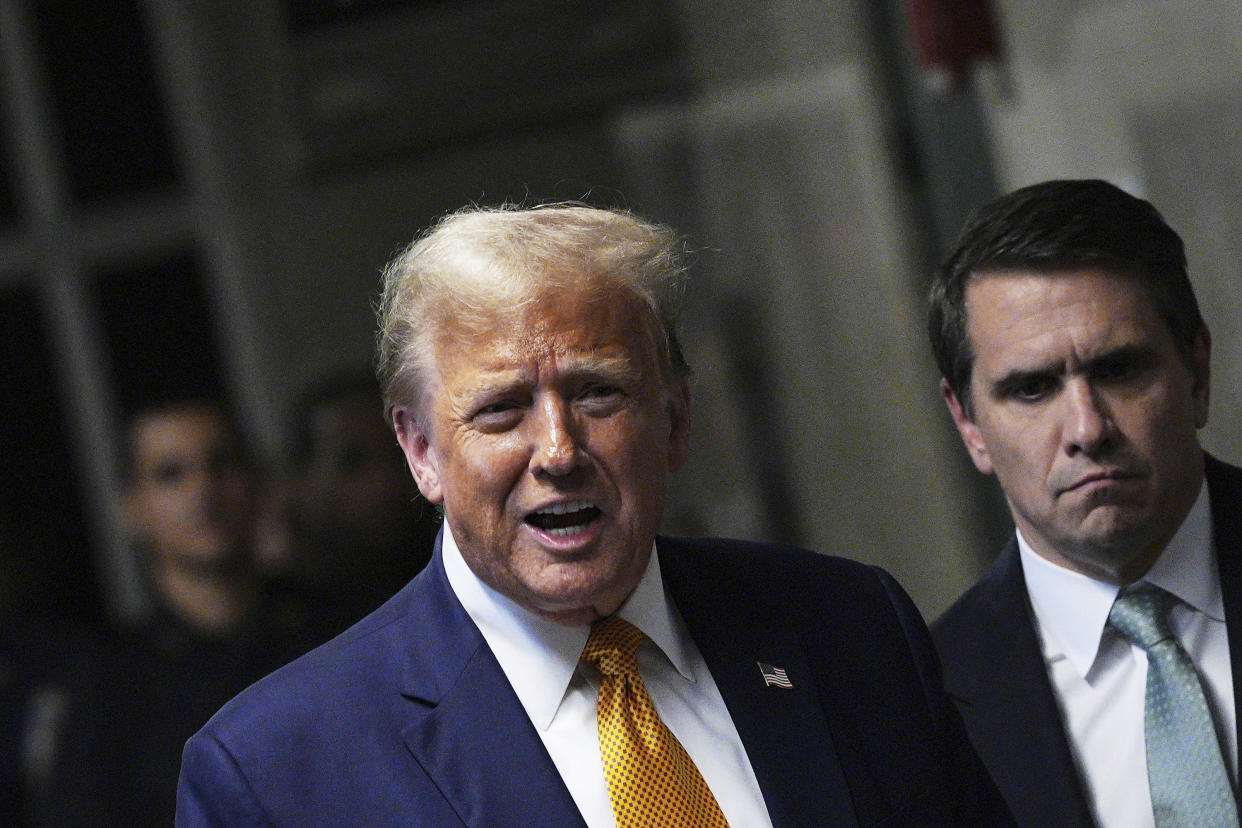Donald Trump asks New York’s high court to intervene in fight over gag order in hush money trial

- Oops!Something went wrong.Please try again later.
- Oops!Something went wrong.Please try again later.
- Oops!Something went wrong.Please try again later.
NEW YORK (AP) — Donald Trump is seeking to have New York’s highest court intervene in his fight over a gag order that has seen him fined $10,000 and threatened with jail for violating a ban on commenting about witnesses, jurors and others connected to his hush money criminal trial.
The former president’s lawyers filed a notice of appeal Wednesday, a day after the state’s mid-level appellate court refused his request to lift or modify the restrictions. The filing was listed on a court docket, but the document itself was sealed and not available.
Trump presidential campaign spokesperson Steven Cheung said it's a request for the state’s Court of Appeals to take up the matter.
“President Trump has filed a notice to appeal the unconstitutional and un-American gag order imposed by conflicted Judge Juan Merchan in the lawless Manhattan DA case," Cheung said in a statement.
"The threat to throw the 45th President of the United States and the leading candidate in the 2024 presidential election in jail for exercising his First Amendment rights is a Third World authoritarian tactic typical of Crooked Joe Biden and his comrades,” Cheung said.
A five-judge panel of the mid-level appeals court, the Appellate Division of the state’s trial court, ruled Tuesday that Merchan “properly determined” that Trump’s public statements “posed a significant threat to the integrity of the testimony of witnesses and potential witnesses in this case as well.”
Trump had asked the state’s intermediate appeals court to lift or modify the gag order. Among other restrictions, it bars him from making or directing others to make statements about witnesses like his fixer-turned-foe Michael Cohen, who will testify for a third day Thursday. It also prohibits comments about court staff, the judge’s family and prosecutors other than Manhattan District Attorney Alvin Bragg.
Bragg's office declined comment. A message seeking comment was left with a spokesperson for the state court system.
“The gag order has to come off," Trump told reporters as he headed into court Tuesday. Later, he lamented, “As you know, I’m under a gag order, so I can’t answer those very simple questions you’re asking me.”
Trump has been noticeably more circumspect in his comments after Merchan held him in contempt of court and fined him a total of $10,000 for violating the gag order 10 times in recent weeks. The judge told Trump last week that future gag order violations could send him to jail.
Among the violations were Trump’s several attacks on Cohen, including an April 13 social media post asking, “Has disgraced attorney and felon Michael Cohen been prosecuted for LYING? Only TRUMP people get prosecuted by this Judge and these thugs!”
Merchan also flagged reposts Trump made of a New York Post article that described Cohen as a “serial perjurer,” and a Trump post quoting Fox News host Jesse Watters’ claim that liberal activists were lying to infiltrate the jury.
Merchan's jail warning came after he ruled Trump had violated the gag order a final time when, in an April 22 interview with television channel Real America’s Voice, he criticized the speed at which the jury was picked and claimed, without evidence, that it was stacked with Democrats.
Merchan issued the gag order March 26 after prosecutors raised concerns about Trump’s propensity to attack people involved in his cases. He expanded it April 1 to prohibit comments about his own family after Trump lashed out on social media at the judge’s daughter, a Democratic political consultant, and made false claims about her.
Trump appealed the gag order April 8, just days before the start of jury selection. At an emergency hearing before a single judge of the Appellate Division, Trump’s lawyers argued the order was an unconstitutional curb on the Republican presidential nominee’s free speech rights while he’s campaigning and fighting criminal charges.
Specifically, according to court papers, Trump challenged restrictions on his ability to comment about Matthew Colangelo, a former Justice Department official who is a part of the prosecution team, and Merchan’s daughter, whose firm has worked for Trump’s rival, President Joe Biden, and other Democrats.
In its ruling Tuesday, the Appellate Division noted that Trump wasn’t claiming that the gag order had infringed on his right to a fair trial. Rather, Trump’s lawyers argued that prohibiting him from commenting about Colangelo and Loren Merchan restricted his ability to engage in protected political speech and could adversely affect his campaign.
The appeals court ruled that Judge Merchan "properly weighed” Trump’s free speech rights against the “historical commitment to ensuring the fair administration of justice in criminal cases, and the right of persons related or tangentially related to the criminal proceedings from being free from threats, intimidation, harassment, and harm.”

